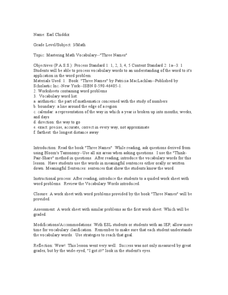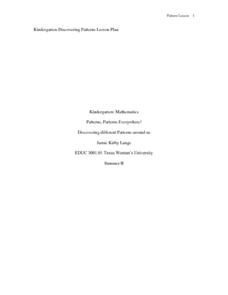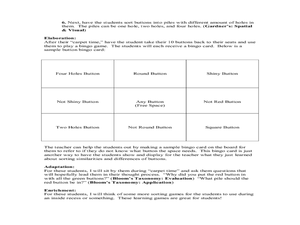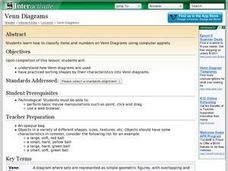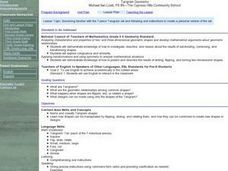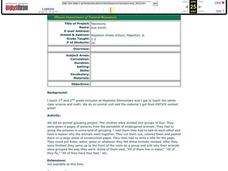Curated OER
Fun With Sorting and Classifying
Using a variety of activities, kindergartners explore sorting and classification. Learners engage in an online sorting activity, read books involving classification, and create their own class book. This is a marvelousway to explore this...
Curated OER
Classification of Cerealites
Middle schoolers create a dichotomous key. In this categorizing lesson, students create a dichotomous key for different types of cereal. Middle schoolers classify the cereal into groups such as flakes and cereal with holes. Students...
Curated OER
Exploring Polygons and The Greedy Triangle
Excellent lesson! Anne Linehane's geometry story, The Greedy Triangle, offers an opportunity to practice forming various types of polygons with your learners. Using elastic bands (or Chinese jump ropes), partners form the various shapes...
Curated OER
Classification: Dichotomous Key
Students investigate the classification process and nomenclatures used for classifying organisms. They study dichotomous keys to identify organisms with 90% accuracy. Students organize information regarding the relatedness of species.
Curated OER
Sorting
A lesson on classification and sorting is here for you. Elementary schoolers participate in an interactive computer game in which they sort books by theme. They take a trip to the library to observe and discuss how books are sorted, and...
Curated OER
Classifying Lesson Plan
Students classify objects according to their similar characteristics.
Curated OER
three Names Lesson
After the book Three Names is read aloud, math vocabulary is introduced . Either alone or in groups, learners use the vocabulary words in a meaningful sentence. Then they complete the provided worksheet.
Curated OER
Mastering Math Vocabulary- The Three Bears
Integrate reading and math to increase your class' vocabulary. Read The Three Bears by Paul Galdone. Then have your third graders complete a worksheet containing math problems related to the story.
Curated OER
Using Bloom's Taxonomy in Science
Help your students internalize knowledge by creating activities that utilize higher level thinking skills.
Texas Woman’s University
Patterns, Patterns Everywhere!
Not only is pattern recognition an essential skill for young children to develop, it's also a lot of fun to teach! Over the course of this lesson, class members participate in shared readings, perform small group activities, and complete...
Curated OER
It Counts
Students classify and compare plants using specific information, observations, and numbers. In this mathematical inquiry lesson, students use plant characteristics to describe, compare, and classify them. They attempt to develop a system...
Curated OER
Hardware Sort
High schoolers work in groups to sort and classify a variety of hardware materials commonly found in the store. Students discuss attributes and explain their reasoning for different classifications.
Habits of Mind
Haileybury Habits of Mind Learning Resource Book
Imagine a learning community committed to using Costa and Kallick's Habits of Mind as the basis of curriculum design. The resource book is packed with lessons that are designed for and identify the standards and habits of mind targeted...
Curated OER
Grouping Buttons
Looking for a good instructional activity on counting and sorting? This instructional activity is worth a look! In this classification instructional activity, learners sort buttons by color, shape, shiny verses not shiny, or number of...
Curated OER
From Curiosity Cabinet to Museum Collection
Students study binomial nomenclature and museum-based research. They create a curiosity box, label the objects in their curiosity box , develop a classification scheme for the objects, and create a database of all objects collected by...
National Science Teachers Association
Hop into Action
Young scientists find out what makes amphibians such unique and interesting animals in this simple life science lesson. After looking at pictures and discussing the characteristics of amphibians, learners complete a series of three Venn...
Curated OER
What's Your Classification
Students classify animals. In this animal groups lesson, students watch a video on animal groups and review the six animal groups. Students practice classifying animals using stuffed animals.
Curated OER
Ornithology and Real World Science
Double click that mouse because you just found an amazing lesson! This cross-curricular Ornithology lesson incorporates literature, writing, reading informational text, data collection, scientific inquiry, Internet research, art, and...
Curated OER
Classification is Sweet
Students classify, weight and organize items during this lesson. This lesson works great as or with an introduction of the Periodic Table of Elements.
Curated OER
Venn Diagram and Shape Sorting Lesson Plan
Students use Venn diagrams to represent classifications of shapes and to use counting arguments to find the number of objects in a given set.
Curated OER
Do Touch!
Students explore the sense of touch. They investigate unknown solids using the sense of touch. Pupils use their senses of touch to match feely gloves. Students explore body parts, by tracing their hands and feet on paper. They create a...
Curated OER
Tangram Geometry
Students listen to a story involving Tangram pieces. Students use Tangram pieces to complete shapes using an outline of a design.
New York City Department of Education
Egypt
This six-week unit encompasses all subjects with a focus study on world history and the development of ancient civilizations. As gifted and talented students dive into the interesting yet challenging topic of Egypt, they think critically...
Curated OER
Taxonomy
Students work together to identify groups of endangered animals. Using a pamphlet, they group the pictures according to specific criteria and cut the pictures out and color them. They place the animals in the correct habitat and share...








